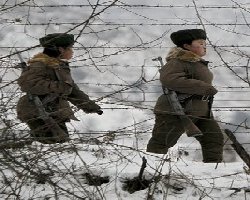Diplomatic impasse over Korea peninsula crisis
07/12/2010| IslamWeb
Efforts to resolve the crisis on the Korean peninsula looked deadlocked on Tuesday after the United States and its main Asian allies urged China to bring North Korea to heel, pressure Beijing has repeatedly resisted.
Secretary of State Hillary Clinton held talks with her Japanese and South Korean counterparts, saying they shared grave concerns over "provocative attacks from North Korea" and put the onus on China to take action.
Earlier, in their first discussion on North Korea since its attack on the South two weeks ago, Chinese President Hu Jintao told President Barack Obama that Washington must return to the negotiating table with the North, warning that the situation could "spiral out of control" without talks.
The United States, South Korea and Japan have been lukewarm to China's proposal for emergency talks between the six regional powers, worried they could be perceived as rewarding Pyongyang for its attack on a South Korean island.
"I think the fact that it took Hu and Obama 13 days even to talk about the attack shows what little chance there is of any real agreement," said Brian Myers, an expert on the North's ideology at Dongseo University.
"I agree with the South Korean consensus that the Chinese are simply trying to look like they're doing something for peace, without having to offend the North."
Analysts say Pyongyang will likely carry out more provocations following last month's deadly bombardment of a South Korean island and its revelations of nuclear advances for two reasons: to cement a father-to-son leadership transition and to win concessions at any international talks.
"The bottom line: North Korea isn't going to change is behavior any time soon, and the United States, South Korea and the world will have to live with this reality," said Andrew Scobell, a North Korea expert at the U.S. Army War College.
Analysts said Hu's comments showed greater urgency but that China was reluctant to lean too hard on the North in the midst of a leadership transition, for fear of a collapse that could send refugees streaming across its border and hand dominance over the entire peninsula to South Korea and the United States.
"The problem is Beijing has been cornered. The three parties got together without China. China has been sidelined," said Zhu Feng, professor of international relations at Peking University.
"China is in a deepening dilemma: how to struggle with the balance between maintaining ties with Pyongyang and maintaining cooperation with Washington. Maybe Beijing may be more motivated now to wake up to a new reality."
Admiral Mullen to Seoul
Meanwhile, as South Korea staged live-fire drills around the country, Obama sent his top military officer to Seoul.
Admiral Mike Mullen's visit comes as local media reported the South Korean and U.S. militaries might soon conduct another joint military exercise. Last week, Washington sent an aircraft carrier to a combined maneuver off the west coast.
China views North Korea as a strategic buffer against the United States and its allies, and is Pyongyang's largest trade partner and benefactor.
After the trilateral meeting in Washington, Clinton said Beijing had "a special role to play in helping to shape North Korea's behavior."
But with China not invited to the Washington meeting and North Korea showing little sign of backing down, the allies had scant progress to show from Monday's talks beyond their attempts to have China join in condemning the attacks as a way to further isolate North Korea.
Analysts say Beijing's relationship with Pyongyang provides a valuable communication bridge, but consider China's influence over the North's as limited.
"China is not in control of North Korea. Most emphatically, it is not. It cannot do much, even if it wishes," said Andrei Lankov of Kookmin University in Seoul.
Clinton said she was open to resuming talks on the North's nuclear ambitions -- the six-party talks include the two Koreas, China, Japan, Russia and the United States -- but Pyongyang must first take steps to end its belligerence and keep its 2005 commitment to abandon its nuclear programs.
PHOTO CAPTION
North Korean soldiers patrol on a pathway along the bank of the Yalu River, the China-North Korea border river, near North Korea's town of Sinuiju, opposite side of the Chinese border city of Dandong, Sunday Nov. 28, 2010
Reuters
www.islamweb.net

